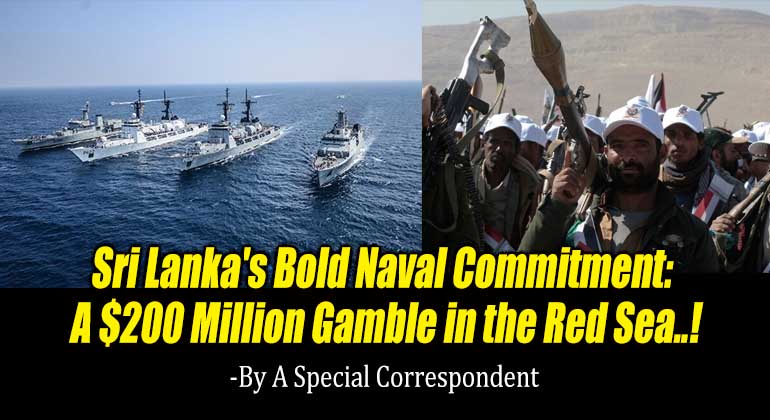-By A Special Correspondent

(Lanka-e-News -03.Jan.2024, 11.30 PM) In an unprecedented move that has raised eyebrows both domestically and internationally, Sri Lankan President, Ranil Wickramasinghe, recently pledged to deploy the country's naval vessels in the Red Sea to counter Houthi rebels. While framed as a commitment to safeguard maritime navigation and contribute to regional stability, this decision comes with a hefty price tag of $200 million, a burden shouldered by the Sri Lankan taxpayers. As the nation grapples with economic challenges, the president's bold move prompts questions about the necessity, financial implications, and potential ramifications of such a significant military commitment.
President Ranil's announced the naval deployment during a recent address to the nation, emphasizing Sri Lanka's commitment to international peace and security. The decision is framed as a strategic move to protect vital shipping routes in the Red Sea, where Houthi rebels have posed a threat to maritime navigation.
The president outlined the perceived risks to global trade posed by the Houthi rebels and highlighted the importance of Sri Lanka's contribution to regional stability. The naval deployment is portrayed as a proactive measure to address potential disruptions to maritime commerce, underlining Sri Lanka's role as a responsible player in the international community.
While the president's commitment to safeguarding maritime navigation has garnered support from some quarters, concerns are mounting over the financial burden placed on Sri Lankan taxpayers. The estimated cost of deploying naval vessels to the Red Sea is a staggering $200 million, a figure that has sparked criticism and calls for transparency regarding the allocation of such significant funds.
The president's administration defends the expenditure, arguing that it is a necessary investment in national security and the protection of economic interests. Officials stress the importance of maintaining open and secure sea lanes for Sri Lanka's trade, which heavily relies on maritime routes. However, critics question the urgency and scale of the naval deployment, suggesting that alternative diplomatic and economic measures could achieve similar objectives without the exorbitant cost.
At a time when Sri Lanka is grappling with economic challenges, including high inflation, a depreciating currency, and rising debt, the $200 million allocation for the naval deployment raises questions about prioritization. Critics argue that the funds could be better utilized to address pressing domestic issues, such as infrastructure development, healthcare, and poverty alleviation.
The opposition has seized on the opportunity to criticize the government's decision, framing it as a misplaced allocation of resources. They argue that in a period of economic uncertainty, the administration should focus on bolstering the country's financial resilience rather than committing substantial funds to a military venture in a distant region.
The deployment of Sri Lankan naval vessels in the Red Sea also carries potential geopolitical ramifications. While the move is presented as a contribution to regional stability, some analysts suggest it could escalate tensions in an already volatile area. Sri Lanka's involvement in a conflict zone may draw international attention, raising concerns about unintended consequences and the nation's role in broader geopolitical dynamics.
Additionally, the global perception of Sri Lanka's decision to deploy naval forces against Houthi rebels is mixed. While some nations applaud the commitment to maritime security, others question the motives and the potential impact on diplomatic relations. Sri Lanka finds itself at the center of a delicate balancing act, attempting to assert its role on the international stage while navigating potential diplomatic challenges.
President Ranil Wickramasinghe's pledge to deploy Sri Lankan naval vessels in the Red Sea against Houthi rebels reflects a complex intersection of national security, economic priorities, and global geopolitics. While the commitment to safeguard maritime navigation is a laudable goal, the $200 million price tag raises legitimate concerns about fiscal responsibility and the allocation of resources in a challenging economic climate.
As Sri Lankan taxpayers shoulder the financial burden of this naval deployment, the government must address the growing calls for transparency and accountability. The nation watches closely as it embarks on this ambitious venture, hoping that the benefits in terms of regional stability and international recognition will outweigh the significant economic gamble undertaken by the administration.
---------------------------
by (2024-01-03 19:56:28)
Leave a Reply